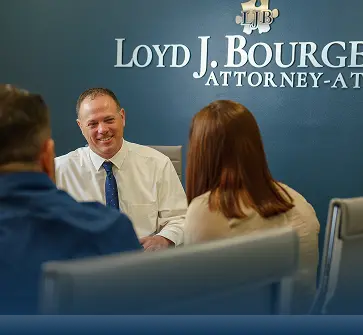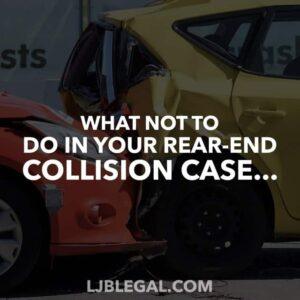
What Is Comparative Fault?
Comparative fault is a legal rule that determines how much money someone can recover after an accident when more than one person shares blame. Instead of one driver being completely responsible, the law divides fault between everyone involved based on their actions.

In Louisiana, this means if you’re hurt in a crash but were partly to blame, you might still be able to recover money. However, your total award will be reduced by your percentage of fault.
If you’re wondering, Can I still file a claim if I was partly at fault in a car accident?, the answer is usually yes. But how much you receive depends on how much blame is assigned to you.


We GET IT DONE
Clients trust us to handle their case properly and effectively
FREE Confidential Case Review (985) 240-9773How Does Comparative Fault Work After a Car Accident?
Under Louisiana’s comparative fault system, each person involved in an accident is assigned a percentage of fault. This can be decided by an insurance adjuster, a judge, or a jury. Your damages, or the money you could recover, are then reduced based on your share of the blame.
Example: If you’re 20% at fault and your damages are $10,000, you would receive $8,000. If you’re 40% at fault, you would only get $6,000.
This is different from contributory negligence, which some states still use. Under that rule, if you’re even 1% at fault, you can’t recover anything. Louisiana does NOT follow contributory negligence.


We DO THE RIGHT THING
The correct choice – always – is to do the right thing.
FREE Confidential Case Review (985) 240-9773What Are the Different Types of Comparative Fault?
The main types of fault systems used across the United States are pure comparative fault, modified comparative fault, and pure contributory negligence. These rules determine whether and how much compensation someone can recover after an accident, depending on their share of fault.
- Pure comparative fault: Allows injured people to recover money even if they were mostly at fault.
- Modified comparative fault: Limits recovery to those found 50% or less (or 49% or less in some states) at fault.
- Pure contributory negligence: Completely bars recovery if the injured person is even 1% at fault.
What Is Pure Comparative Fault?
Before January 1, 2026, Louisiana followed pure comparative fault. This means you can still recover money for your injuries even if you’re mostly at fault, as long as you’re not entirely responsible. Your award is simply reduced by your percentage of fault. Louisiana’s current comparative fault law is found in Louisiana Civil Code 2323.
Example: If your damages are $100,000 and you are 30% at fault, you can still recover $70,000. Even if you’re 90% at fault, you could still get $10,000.
What Is Modified Comparative Fault?
Beginning January 1, 2026, Louisiana switched to a modified comparative fault system. Under this rule, if you are found to be 51% or more at fault, you will not be able to recover anything.
Example: If you’re found 51% at fault in a crash, even if the other driver is 49% to blame, you get nothing. No help with medical bills. No compensation for lost wages. No payment for pain and suffering.
What Is Pure Contributory Negligence?
Pure contributory negligence is the strictest system. Under this rule, if you are even 1% at fault, you cannot recover any compensation at all. Only a few states, like Alabama and Maryland, still follow this system.
Louisiana does not use pure contributory negligence. Instead, it currently uses a fairer comparative fault system that allows injured people to recover partial compensation based on their percentage of fault.


We ARE TRANSPARENT
We don’t play games and we don’t hide the ball.
FREE Confidential Case Review (985) 240-9773What Is the Difference Between Pure and Modified Comparative Fault?
The main difference between pure and modified comparative fault is how much fault a person can have and still recover money after an accident. Under a pure comparative fault system, like the one Louisiana uses until January 1, 2026, you can still recover some money even if you were mostly at fault. But under a modified comparative fault system, which will apply to accidents in Louisiana starting in 2026, you can only recover damages if you were 50% or less at fault. If you’re found 51% or more responsible, you get nothing.


We ARE COMPASSIONATE
Emotionally intelligent listeners with positive attitudes.
FREE Confidential Case Review (985) 240-9773Why Did Louisiana’s Comparative Fault Law Change?
At first glance, this might sound fair. If someone is more at fault, why should they receive money from a claim? But here’s the problem: this new rule makes it much easier for insurance companies to deny legitimate claims.
All they have to do is argue that you were just slightly more responsible. The other driver might have run a red light, but if you were speeding, they’ll say your speeding makes you 51% at fault. If they can convince an adjuster, judge, or jury, you get nothing.
This law change will encourage more blame-shifting. Insurance companies will dig deeper to try to pin more responsibility on you. Even if they don’t win, it will slow the process, keep you waiting longer for your money, and lead to more lawsuits, not fewer.
When Did the New Louisiana Comparative Fault Law Take Effect?
- Louisiana moved from pure to modified comparative fault on January 1, 2026.
- The change applies to all accidents that occur on or after that date.
- Under the new law, only those found 50% or less at fault can recover damages.
See the full new law here: House Bill 431
How Can a Louisiana Personal Injury Lawyer Help With Comparative Fault?
This law raises the stakes for anyone hurt in a Louisiana accident. Insurance companies will use it to their advantage, looking for any reason to put more blame on you. That’s why it’s critical to have a law firm that understands both the current and upcoming rules.
At LJBLegal, we know how to protect your rights and keep insurance companies from twisting the facts. Whether your case falls under the current pure comparative fault system or the new modified rule, we’ll build the strongest possible case for you.
If you’ve been hurt and aren’t sure how much blame the insurance company is trying to assign to you, call 985-240-9773. We’ll talk through your situation and explain your next steps clearly and honestly.















